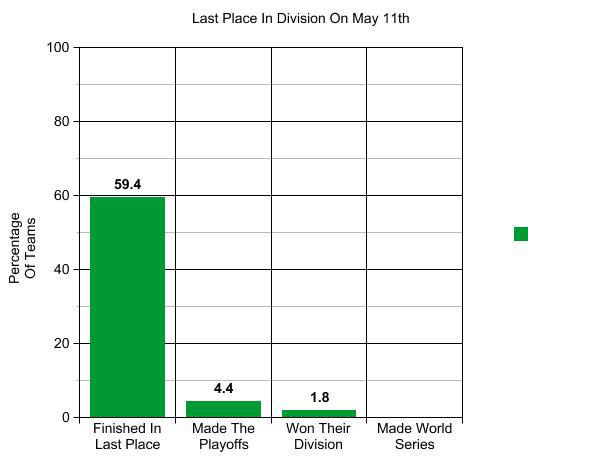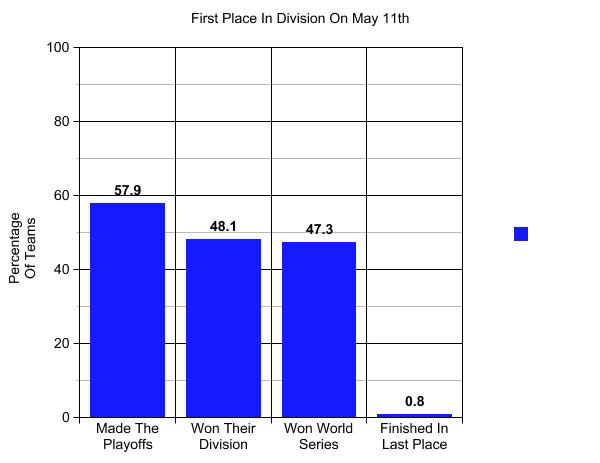How Much Does The First Month Of The MLB Season Matter?
Bryan Altman, CBS Local Sports
If you have ever paid any mind to the never-ending NFL coverage during the earliest parts of football season, you've undoubtedly been subjected to statistics much like the following:
"If your team is 0-1, they only have a 25 percent chance of making the playoffs. If they're 0-2, forget about it - 13 percent chance," and so on and so forth.
I get it. There's a whole lot of downtime between NFL games and we need something to talk about in the interim. Granted, there's much less downtime than ever before now that four of the seven nights of the week have NFL games, but that's besides the point.
The point is that the start of the season in the NFL is pretty damn important, which made me wonder whether the same is true in baseball. How important is a teams' start to the MLB season? Does first place really matter in May? Does last place? Does anything when we're talking about 162 freaking games of baseball over a five month stretch of time? Well, quite simply, the answer is yes.
The first thing I decided to do in an attempt to figure out how important baseball games are early in the year was comb through the standings from the last 19 years. Why 19 years? Because I decided to start at the beginning of baseball's wild card era, which began in 1994. Then came the MLB lockout, which saw the 94' season disappear like Clayton Kershaw in a meaningful game against the Cardinals (too soon?). The lockout also gave us a slightly abridged 95' season as well, so I began with the first full season of the wild card era in 1996.
Then I decided to select a date from the beginning of the season that I could use as the focal point of this experiment. I chose May 11th.
Why May 11th? Because that was the day I decided to spend the next week of my life looking at nothing but baseball standings.
So I went back through the annals of recent baseball history and looked up which team was in first place on May 11th, which team was in last place, and where they ended up at the end of the year for each season since 1996 to see how much their start mattered.
Since 1996, only five teams out of 114 (4 percent) have managed to work their way out of last place on May 11th and into a playoff spot by the end of the season. Those five were the 1996 Cardinals, 2005 Astros, 2007 Rockies, 2010 Braves and most recently the 2013 Dodgers. Of those five, only two of them fought back to win their division, the 1996 Cardinals and the 2013 Dodgers.

Needless to say, those teams are far and away the anomaly. What's much more common for teams that find themselves in last place early in the season is that they stay there. For good. Of the 114 teams, 68 of the teams that were in last place on May 11th finished the season in dead last in their division as well. That's close to 60 percent of MLB teams, meaning a majority of them are, what we thought they were, early on in the year.
So what about the contenders? You know, the teams that shoot out of the gate and look like they're poised for greatness before dreary days of summer baseball set in? They're in far better shape than the teams that start out in last, but there are no guarantees when it comes to the teams on top in May - especially within the last 10 years.
According to the MLB standings, since 1996, roughly 42 percent of the teams that are leading their division on May 11th will end up missing the playoffs all together. No wild card berth, no division crown, nothing to show for being the best team in their division in the early months of the season (sorry, Mets fans).

However, it should be noted that this year's top teams have a leg up on history. The six teams leading their respective divisions on May 11th - the Mets, Yankees, Royals, Cardinals, Dodgers and Astros - all lead the second place team in their division by an average of 3.9 games. Over the last 19 years, the average number of games that the six division leaders had between them and the second place team in their division was only 2.33 games.
Still, as the years have gone on, the likelihood of the top teams maintaining their position in the standings has decreased drastically. From 1996 to 2004, the number of teams that missed the playoffs after having a division lead on May 11th was only about 27.5 percent. In the last 10 years, from 2005 to 2014, the number has doubled from 27.5 percent to a whopping 55 percent.
The increase in the volatility of the standings is almost entirely inexplicable, especially when you consider the fact that an extra wild card spot was added for each league in 2011, giving the top teams more chances than ever to hang onto a playoff berth.
It could be a result of more parity in baseball, which has been at an all time high in recent years. The majority of MLB teams these days seem to oscillate around the .500 mark, making their margin for error - and the divide between them and their opponents far smaller than ever.
While fewer teams that are leading their division early in May are making the playoffs, those of them that make it to the postseason are still having plenty of success. Of the past 19 teams to win the World Series, almost half of them were in first place in their division on May 11th - including last year's World Series winners - the San Francisco Giants.
Even though the success of these early performers isn't guaranteed, what's almost guaranteed is that if they fall in the standings, they usually don't fall too far at all.
Since the beginning of the wild card era, only one team has finished in last place in their division after leading it on May 11th: The 2006 Colorado Rockies. And they didn't even finish in last place all by themselves - the Arizona Diamondbacks were kind enough to keep them company with a matching 76-86 record.
So while it's easy to dismiss the early months of the MLB season as irrelevant thanks to the length of the season - do so at your own peril. Those who get ahead early, typically stay ahead. And those teams that fall behind aren't just fighting all of the teams on top of them in the standings, but 20 years of history as well.
More from Bryan? You can email him or find him on Twitter @bcaltman.




